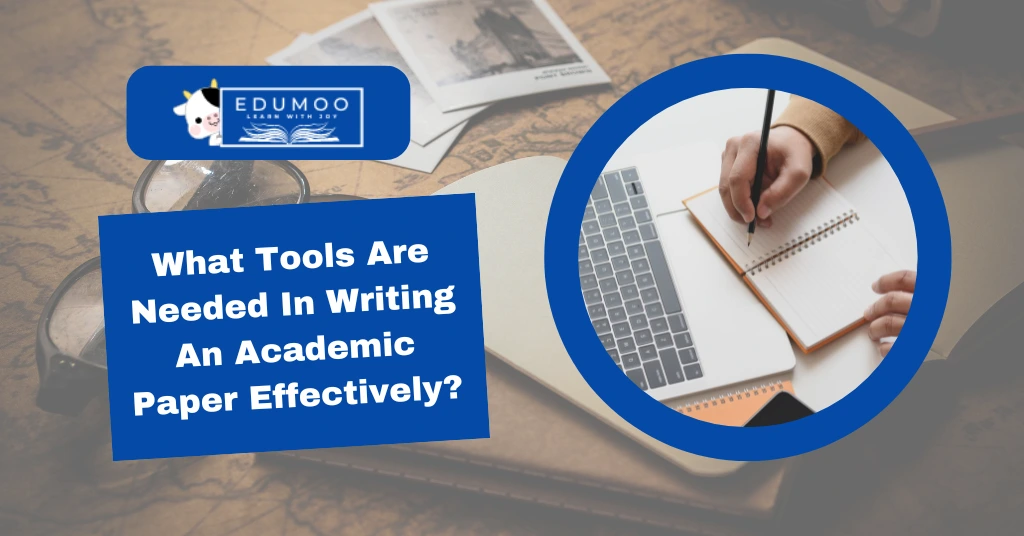Writing an academic paper can be challenging, but the right tools make it much easier. Whether you’re drafting your first essay or working on a research paper, using proper tools can help you organize, write, edit, and cite your work effectively. This blog explains what tools are needed in writing an academic paper effectively for college students.
| Also Check: Top Math Tools for Students – Simplify Calculations |
Why Use Tools for Academic Writing?
Academic writing requires structure, precision, and clear communication. Tools save time and reduce errors. They improve the quality of your work and make the process smoother.
Benefits of Using Tools:
- Ensures proper formatting.
- Helps avoid plagiarism.
- Enhances language clarity.
- Saves time during research.
What Tools Are Needed In Writing An Academic Paper Effectively?
Academic writing involves several stages: planning, research, writing, editing, and referencing. Below, you’ll find tools for each stage.
1. Planning Tools
Before writing, planning is crucial. Organizing ideas helps you stay on track.
Best Tools for Planning
- MindMeister
- A mind-mapping tool for brainstorming ideas.
- Helps you visually outline topics and subtopics.
- Trello
- Organize tasks and deadlines.
- Create a checklist for each writing stage.
- Google Keep
- Note-taking app for quick ideas.
- Syncs notes across devices.
Example:
If you’re writing about climate change, use MindMeister to brainstorm topics like causes, effects, and solutions.
2. Research Tools
Finding reliable sources is key to academic writing. Research tools simplify this process.
Best Tools for Research
- Google Scholar
- A search engine for academic articles and books.
- Access free and paid research papers.
- JSTOR
- A digital library with journals, books, and primary sources.
- Ideal for historical and cultural research.
- Zotero
- Collects and organizes research materials.
- Automatically saves online articles and citations.
3. Writing Tools
Good writing tools ensure clarity, proper grammar, and structure.
Best Tools for Writing
- Microsoft Word
- Offers templates for academic papers.
- Features grammar and spell-checking.
- Google Docs
- Free alternative to Word.
- Allows collaboration and auto-saving.
- Scrivener
- Useful for long projects like these.
- Helps structure complex documents.
Example:
Use Google Docs to write drafts with peers, and Microsoft Word for final formatting.
4. Grammar and Style Checkers
Academic papers must be error-free. These tools improve grammar and style.
Best Tools for Editing
- Grammarly
- Checks grammar, spelling, and punctuation.
- Offers suggestions for better readability.
- Hemingway Editor
- Highlight complex sentences.
- Ensures a readability score below 7.
- ProWritingAid
- Advanced tool for improving sentence structure.
- Offers in-depth writing analysis.
Example:
After writing, run your document through Grammarly to fix basic errors, then use Hemingway Editor for clarity.
5. Citation and Referencing Tools
Citing sources correctly avoids plagiarism. Use tools to create accurate references.
Best Tools for Referencing
- Mendeley
- Manages citations and bibliographies.
- Syncs with Word for easy referencing.
- BibMe
- Generates citations in APA, MLA, and other formats.
- Easy to use for beginners.
- Cite This For Me
- Online tool for creating citations quickly.
- Works with books, websites, and articles.
Example:
If your professor requires APA style, use BibMe to create in-text citations and a bibliography.
6. Plagiarism Checkers
Plagiarism is a serious academic offense. Use these tools to ensure originality.
Best Tools for Checking Plagiarism
- Turnitin
- Widely used by colleges to detect plagiarism.
- Provides detailed similarity reports.
- Quetext
- User-friendly tool for plagiarism detection.
- Highlights copied content and suggests fixes.
- Copyscape
- Best for checking web-based plagiarism.
- Helps identify duplicate online content.
Example:
Upload your paper to Turnitin before submission to ensure originality.
7. Time Management Tools
Managing time effectively prevents last-minute stress.
Best Tools for Time Management
- Pomodoro Timer
- Breaks work into 25-minute sessions.
- Helps you stay focused and avoid burnout.
- Todoist
- Task management app with reminders.
- Create deadlines for each writing stage.
- RescueTime
- Tracks how you spend time online.
- Blocks distracting websites.
Example:
Use the Pomodoro Timer to focus on writing for short bursts and take breaks in between.
8. Formatting Tools
Formatting ensures your paper meets academic standards.
Best Tools for Formatting
- LaTeX
- Ideal for technical papers and theses.
- Ensures consistent formatting.
- EndNote
- Organizes references and formats them properly.
- Compatible with major style guides.
- Word Templates
- Pre-designed templates for APA, MLA, and other formats.
Example:
For a research paper in physics, use LaTeX to maintain a professional layout.
9. Visualization Tools
Visuals enhance understanding. Use charts, graphs, and diagrams to support your arguments.
Best Tools for Visualization
- Canva
- Easy-to-use tool for creating charts and infographics.
- Offers free and paid templates.
- Excel
- Ideal for creating data-driven graphs and tables.
- Lucidchart
- Create diagrams and flowcharts.
Example:
Use Canva to create an infographic summarizing key points in your paper.
10. Feedback and Peer Review Tools
Getting feedback improves your work. These tools help with collaboration.
Best Tools for Feedback
- Google Docs
- Allows real-time comments and suggestions.
- Slack
- A communication tool for peer review.
- Peergrade
- Helps manage peer reviews in a structured way.
Example:
Share your draft on Google Docs for classmates to comment on your ideas.
Conclusion
Writing an academic paper effectively requires planning, research, and attention to detail. But what tools are needed in writing an academic paper effectively? The right tools simplify the process and improve quality. Start by planning with MindMeister or Trello. Use Google Scholar for research and Grammarly for editing. Don’t forget citation tools like BibMe and plagiarism checkers like Turnitin.
With these tools, you’ll save time and produce better academic work. Explore them today and make your writing journey smoother!

